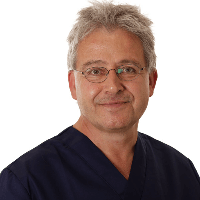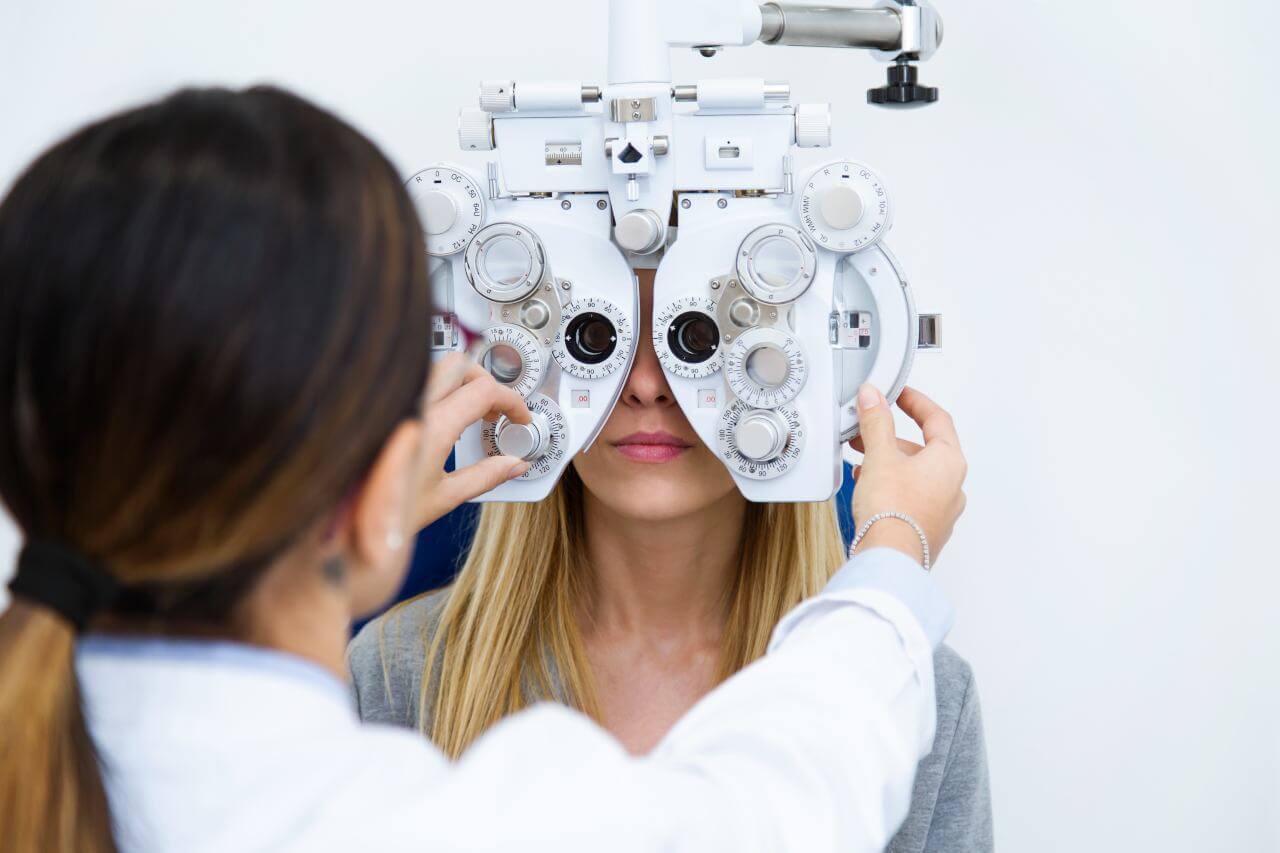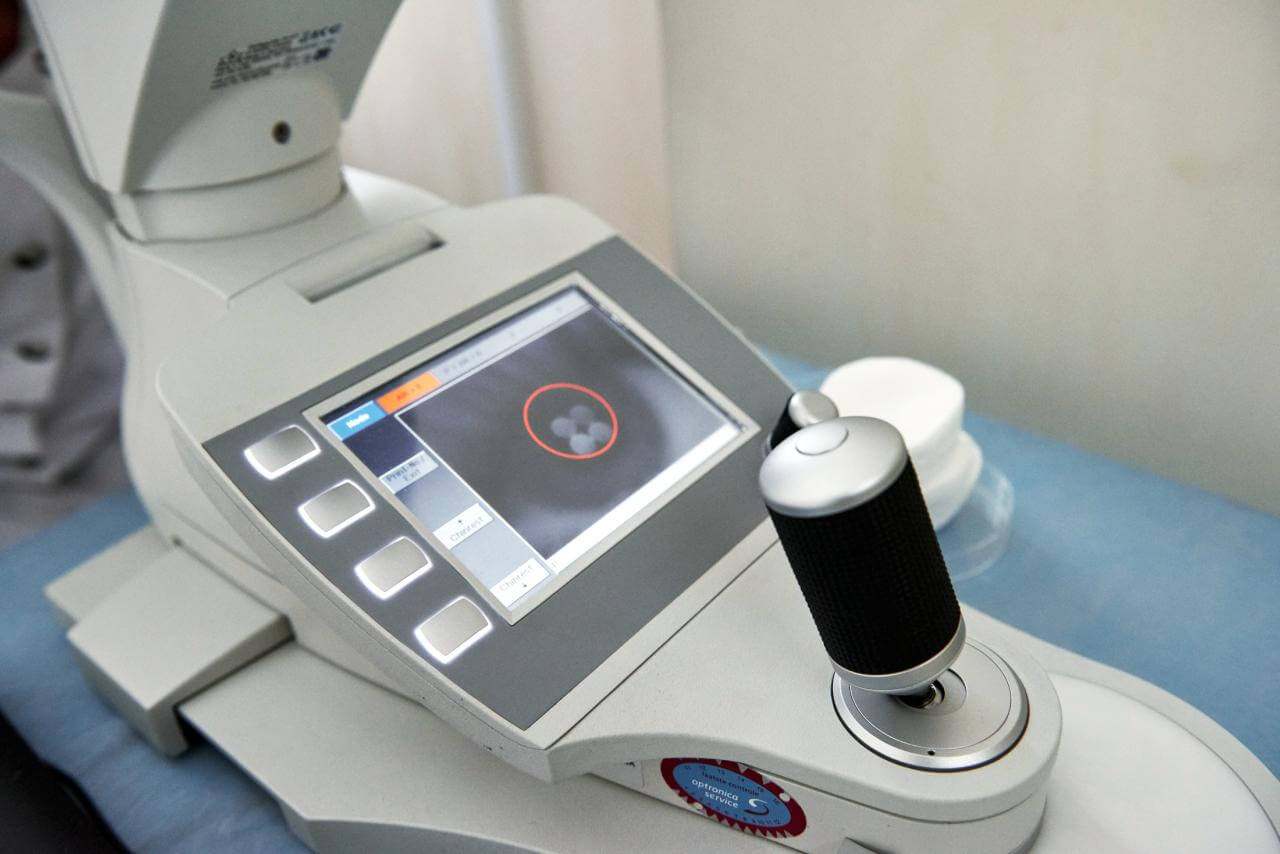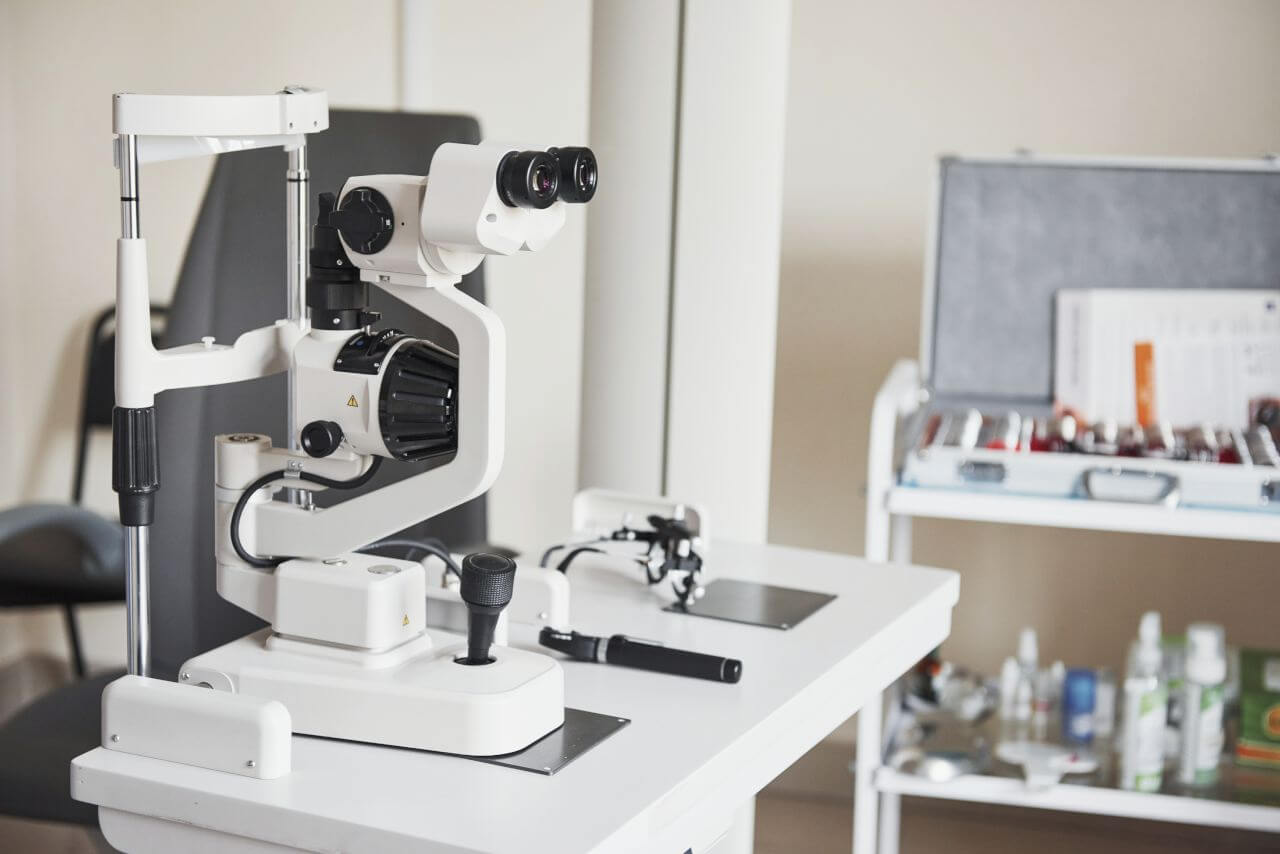
The program includes:
- Initial presentation in the clinic
- clinical history taking
- review of medical records
- physical examination
- ophthalmologic examination:
- slit-lamp examination
- optical coherence tomography OCT (on indication)
- laser doppler retinal vessels
- pupil function tests
- ocular motility test
- ophthalmoscopy
- perimetry (visual field test)
- computer perimetry
- visometry (without correction and with correction)
- keratometry
- pachymetry
- refractometry (objective, subjective, cycloplegic)
- autorefractometry
- non-contact tonometer
- biomicroscopy
- nursing services
- drugs administration into vitreous cavity
- services of chief physician and all leading experts
- explanation of individual treatment plan
Required documents
- Medical records
Service
You may also book:
 BookingHealth Price from:
BookingHealth Price from:
About the department
The Department of Adult and Pediatric Ophthalmology at the Eye Center Frankfurt provides the full range of medical services for the prevention, diagnostics and treatment of diseases of the eye and its appendages. The department's specialists admit not only adults, but also children with visual impairments. The patients of the department are offered various types of conservative therapy and surgical treatment. The medical facility has three high-tech operating rooms for performing surgery on the eye apparatus. Prior to prescribing any treatment, the department's doctors conduct comprehensive diagnostics to identify the causes of visual impairment and select the most effective therapeutic regimen, if possible conservative. The patients receive treatment from highly trained professionals with extensive clinical experience. The department's ophthalmologists regularly increase their knowledge and improve their professional skills, thanks to which patients receive high-quality treatment that meets modern medical standards. The department is headed by Prof. Dr. med. Frank Koch. According to the Focus magazine, the doctor is included in the ranking of the best German experts specializing in the treatment of retinal diseases!
Cataract (partial or complete clouding of the lens) is one of the most common ophthalmic diseases in the world, so the department's doctors often deal with the treatment of this pathology. In most cases, the disease is a consequence of age-related changes, but there are other reasons for its development. Cataracts also occur in children. Without timely treatment, cataracts lead to irreversible blindness, so the department's doctors strongly recommend that patients do not postpone a visit to a specialist if their vision deteriorates. At the stage of diagnostics, a slit lamp exam is mandatory, visual acuity charts are used, and the lens is examined with eye drop pupil dilation. The only effective treatment for mature cataracts is the removal of the clouded lens and its replacement with an artificial intraocular lens. The classic type of cataract surgery is phacoemulsification followed by the artificial lens implantation. When performing the intervention, the ophthalmologist removes the clouded area of the lens using ultrasound, while the lens capsule is not damaged. The intervention is performed through a millimeter incision, which does not require suturing at the end of the operation. The department's doctors use local anesthesia, most often with the help of eye drops. After the operation, the patient is under supervision for some time and can return home after the doctor conducts a follow-up examination and provides the necessary recommendations.
Another common eye disease is glaucoma. The pathology is characterized by rapid progression and the development of irreversible blindness. However, the disease can be successfully treated if the patient contacts the ophthalmologist on time. The causes of glaucoma are elevated intraocular pressure and deteriorated aqueous humor outflow. The disease affects both adults and children. During the diagnostics, the department's doctors measure intraocular pressure, examine the drainage system of the eye (inflow and outflow of aqueous humor), evaluate visual fields, examine the angle of the anterior chamber of the eye, determine the amount of excavation and the thickness of the nerve fibers. Depending on the stage of the disease, the specialists prescribe the optimal type of treatment – drug therapy, laser therapy or surgery. The essence of drug treatment is to take medications to lower intraocular pressure. Doctors are also considering laser treatment methods that allow patients to quickly and painlessly improve intraocular aqueous humor outflow without the surgical intervention. Complex and advanced clinical cases require glaucoma surgery, which is the most effective therapeutic technique. In some situations, it is possible to perform combined surgical interventions for glaucoma and cataract treatment. The department's doctors devote enough time to examining the patient, which allows them to choose the best therapeutic solution.
The department's doctors often deal with the treatment of retinal detachment. With the development of this disease, detachment of the retina from other membranes of the eye occurs, which leads to impaired vision. The risks of developing partial or complete loss of vision in retinal detachment are quite high. The only effective treatment is surgery. Pars plana vitrectomy is the gold standard for retinal detachment surgery. As a rule, surgeons use minimally invasive techniques – instruments are inserted into the eye through small punctures in the sclera. After removing the vitreous body, doctors have convenient access to the retina and can perform all the necessary manipulations on it. The operation can be performed both under general and local anesthesia.
The specialists of the medical facility also regularly provide treatment to patients with diabetic retinopathy, keratoconus, age-related macular degeneration, macular edema, vitreous hemorrhages, presbyopia, myopia and other eye diseases. Conservative methods are used as first-line treatment, but if such therapy does not give the desired result, or doctors are convinced that surgery will be the only effective treatment, a decision is made to perform it.
The specialized pediatric ophthalmologists provide their services to young patients with various visual impairments. The experts recommend the examination by an ophthalmologist, starting at the age of 2-3 years. If there are additional risks, screening can be performed before the age of 2 years. If any pathological changes are detected in the child's eye apparatus, doctors plan further therapeutic measures in order to restore the vision of the young patient.
The department specializes in the diagnostics and treatment of the following eye diseases:
- Cataract
- Glaucoma
- Presbyopia
- Diabetic macular edema
- Vitreous hemorrhage
- Vitreous opacity
- Astigmatism
- Myopia
- Macular edema
- Retinal detachment
- Hyperopia (farsightedness)
- Age-related macular degeneration
- Diabetic retinopathy
- Keratoconus
- Dry eye syndrome
- Uveitis
- Visual impairment in children
- Other diseases of the eye and its appendages
The department's diagnostic and therapeutic options include:
- Diagnostics
- Optical coherence tomography
- Examination using the Pentacam device (tomography of the anterior segment of the eye)
- Preliminary diagnostics before cataract surgery
- Intraocular pressure measurement (tonometry)
- Visual acuity test
- Contrast sensitivity test
- Visual field assessment (perimetry)
- Pupil reaction testing
- Eye movement testing
- Analysis of an image of the retina using digital systems
- Fluorescein angiography
- Treatment
- Intravitreal injections
- Drug carrier implantation into the vitreous body
- Laser treatment of diabetic retinal lesions, tears or holes in the retina and macular edema
- Pars plana vitrectomy (removal of the vitreous body) in case of vitreous hemorrhage, vitreous clouding
- Surgical treatment of cataract (replacement of the clouded lens of the eye with an intraocular lens)
- Strabismus correction
- Other diagnostic and treatment methods
Curriculum vitae
University Education and Professional Career
- Study of Human Medicine at the University of Duisburg-Essen.
- Preparation for board certification, Department of Ophthalmology at the University Hospital Bonn.
- Head of the Section for Retinal Surgery (Senior Physician and Deputy Head of the Department) at the University Hospital Bonn.
- Rotation, Senior Physician, Outpatient Eye Clinic (focus on the treatment of diseases of the anterior segment of the eye) at the University Hospital Bonn.
- Qualified Clinical Research Physician in accordance with the Medicines and Medical Equipment Act.
- Thesis defense with honors and Dr. med. title. Subject: "Influence of long-term exposure to luminescent light on the fundus of the eye of a rat".
- Habilitation in Ophthalmology. Subject: "Clinical and morphological features of pars plana sclerotomy during and after operations on the vitreous".
- C3 Professorship (for life) for Ophthalmology with a focus on retinal and vitreous surgery at the University Hospital Frankfurt am Main.
- Head of the Section for Retinal and Vitreous Surgery with a focus on conservative and surgical treatment of the retina, vitreous and cataracts, University Hospital Frankfurt am Main.
- Head Physician of the Eye Center Frankfurt.
Research Activities
- Development of microscopic illumination systems for surgical interventions on the retina and vitreous body.
- Development of a device for endoscopic interventions on the retina and vitreous.
- Development of devices for minimally invasive vitreous removal through one or two accesses.
- Development and implementation of Eyesi simulation for retinal and vitreous surgery, and later also for cataract surgery and posterior segment examinations.
- Participation in the development of extraocular LED lighting for surgical interventions on the vitreous body.
- Establishment and position of Founding President of the European VitreoRetinal Society (EVRS).
- Initiation of a joint university project Frankfurt-Marburg (vitreoretinal surgery) as a forum for discussion of scientific and clinical developments in the field of vitreoretinal surgery.
- Development and implementation of special diagnostic and surgical simulators for training medical students.
- Training of ophthalmologists in the Department of Ophthalmology at the University Hospital Frankfurt am Main as part of national and international training events.
- Numerous studies in the field of age-related macular degeneration, as well as inflammatory, proliferative and vascular diseases of the eye.
- Creation of a clinically significant concept for the treatment of vascular, inflammatory and proliferative diseases of the eye using a combination of conservative and surgical methods, for example, minimally invasive vitreous removal in combination with a drug carrier implantation.
Clinical Interests
- Surgical treatment of retinal and vitreous pathologies.
- Surgical treatment of cataract.
- Intravitreal injections.
Awards and Honors
- The best doctor specializing in the treatment of diseases of the retina and diabetic eye lesions – the rating of the Focus magazine.
- Listed in the Who's Who.
Review Activities in Specialized Journals
- Ophthalmologica.
- Advances in Therapy.
- Graefe’s Archive for Clinical and Experimental Ophthalmology.
- Vitreous Society Online Journal.
- EEE Journal.
Photo of the doctor: (c) Augenzentrum Frankfurt
About hospital
The Eye Center Frankfurt is a highly specialized medical facility, within the walls of which patients can undergo modern diagnostics and treatment of the full range of diseases of the eye and its appendages. From the first minutes of visiting the center, patients feel the spirit of modern trends and advanced technologies – there is everything for maximum comfort and effective therapy. The special pride of the medical facility are the doctors and nursing staff, who have a huge store of knowledge and unique clinical experience in the field of ophthalmology. The specialists take on the most complex clinical cases and successfully cope with them, giving patients the opportunity to see the world again in bright colors. The Eye Center admits patients of all age groups, including children and the elderly.
The priority areas of the center's work include the treatment of cataracts, glaucoma, presbyopia, diabetic macular edema, vitreous hemorrhages, astigmatism, myopia, macular edema, age-related macular degeneration, diabetic retinopathy, keratoconus, uveitis and dry eye syndrome. Depending on the specific diagnosis and severity of the disease, conservative or surgical treatment is conducted. The ophthalmologists working in the center attach particular importance to thorough and comprehensive diagnostics, which allows them to accurately assess the condition of the organs of vision and determine the optimal treatment tactics.
The Eye Center Frankfurt enjoys an excellent reputation not only in Germany, but also far beyond its borders. The medical staff of the center are convinced that their task is to provide each patient with high-quality medical care using advanced technologies. At the same time, the work of doctors is based on respect and humane attitude towards the patient. The specialists devote enough time to personal communication with patients, answering all their questions regarding the diagnosed disease, possible treatment methods and expected therapeutic results.
Photo: (с) depositphotos
Accommodation in hospital
Hotel
You may stay at the hotel of your choice during the outpatient program. Our managers will support you for selecting the best option.





